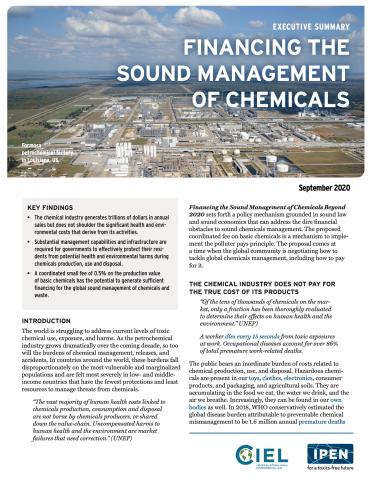Financing the Sound Management of Chemicals Executive Summary

This Executive Summary to Financing the Sound Management of Chemicals Beyond 2020 provides the essential background and facts for the proposed internationally coordinated chemical tax or fee on basic chemicals.
Key Findings
- The chemical industry generates trillions of dollars in annual sales but does not shoulder the significant health and environmental costs that derive from its activities.
- Substantial management capabilities and infrastructure are required for governments to effectively protect their residents from potential health and environmental harms during chemicals production, use and disposal.
- A coordinated small fee of 0.5% on the production value of basic chemicals has the potential to generate sufficient financing for the global sound management of chemicals and waste.
The world is struggling to address current levels of toxic chemical use, exposure, and harms. As the petrochemical industry grows dramatically over the coming decade, so too will the burdens of chemical management, releases, and accidents. In countries around the world, these burdens fall disproportionately on the most vulnerable and marginalized populations and are felt most severely in low- and middle-income countries that have the fewest protections and least resources to manage threats from chemicals.
“The vast majority of human health costs linked to chemicals production, consumption and disposal are not borne by chemicals producers, or shared down the value-chain. Uncompensated harms to human health and the environment are market failures that need correction.” (UNEP)
Financing the Sound Management of Chemicals Beyond 2020 sets forth a policy mechanism grounded in sound law and sound economics that can address the dire financial obstacles to sound chemicals management. The proposed coordinated fee on basic chemicals is a mechanism to implement the polluter pays principle. The proposal comes at a time when the global community is negotiating how to tackle global chemicals management, including how to pay for it.
